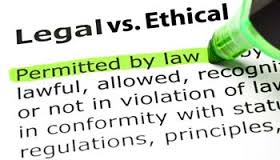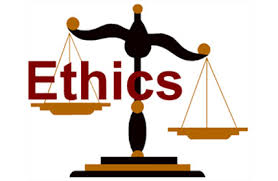The Important Distinction Between Legal and Business Ethics
 We all know the jokes about lawyers – I have to repeat just one of them: Q. Why won’t sharks eat lawyers? A. Professional courtesy.
We all know the jokes about lawyers – I have to repeat just one of them: Q. Why won’t sharks eat lawyers? A. Professional courtesy.
The Chief Legal Officer is a vital player in a corporate compliance program. There is no question about this issue.
However, lawyers can get a little defensive and insecure (no, really?) when they are not the center of attention, or viewed as some almighty oracle. Indeed, think of how many times you have had to sit with a fake grin on your face listening to a lawyer pontificate on how the law works and why you cannot do what you want to do because of legal risks.
Lawyers have their limits and some have viewed them as guardians of a company’s ethical obligation to “do the right thing.” Of course, we all should do the right thing in our work and in our lives. But for some reason, lawyers have been entrusted with something important – an obligation to do the right thing in difficult circumstances.
If we look at the GM Scandal relating to the malfunctioning ignition switch devices, everyone was appalled at the behavior of the lawyers who did not do the right thing in handling the litigation, failing to inform supervisors, and sitting on a problem that was killing innocent customers and users of GM’s products. There is no defense of the GM lawyers, and several of them may be under criminal investigation.
When it comes to corporate culture and a commitment to certain values, including doing the right thing, lawyers are not necessarily the right persons to be the guardians and promoters of that culture. Why?
Lawyers have ethical obligations related to their professional actions (or inactions). The use of the term “ethics” when it comes to lawyers is far different from the notion of corporate ethics and business ethics.
Lawyers are trained to know and follow the law. The law does not by itself define “ethical” conduct. That is a much broader issue. The practice of law requires commitment to professional ethics; again, just to repeat myself, professional ethics for lawyers is far different from a company’s culture and commitment to ethical business conduct.
Not to get too esoteric, but the term “ethics” is rooted in the Greek term “ethos,” which translates into the term character. Ethics is a broader concept designed to promote the common good. Legal concepts can be used to promote ethics, or a common good, but they are not the sole definition of ethics.
Lawyers have an obligation to follow the law and advise their clients to do the same. We all can agree on that – hopefully.
A number of laws attempt to deal with very difficult ethical issues, such as abortion, civil rights, free speech, and other important issues. Again, that is just one aspect of dealing with an ethical issue – the legal component.
Professional codes of ethics are not very helpful in this regard – they define a set of rules to govern the actions of certain professionals when carrying out their responsibilities to clients, patients, and other consumers.
All of this is to make one point very clear – Lawyers are not necessarily the right people to define, protect and promote a company’s ethical culture. They have a more limited mandate. What the law permits is not necessarily the ethical course to follow. Our country’s legal history is filled with blemishes on important ethical issues such as slavery and discrimination.
 In fact, corporate commitment to ethics belongs with everyone at a company and is defined by the board and senior management, and especially the CEO. Every corporate actor carries a company’s commitment to its ethical conduct, or doing the right thing, for the betterment of a company and for society.
In fact, corporate commitment to ethics belongs with everyone at a company and is defined by the board and senior management, and especially the CEO. Every corporate actor carries a company’s commitment to its ethical conduct, or doing the right thing, for the betterment of a company and for society.
Business ethics is an area that needs more attention and awareness. Business schools need to provide more education than a one-course ethics class, and conduct more research in the area of ethical business conduct. Until that happens, there will continue to be some confusion over who is responsible for defining a company’s ethical values and promoting ethical decision-making within the company.
















You did it again….excellent article and a must read for any lawyer. Sent to my lawyer friends already!